- Home
- Sherman Alexie
The Lone Ranger and Tonto Fistfight in Heaven Page 18
The Lone Ranger and Tonto Fistfight in Heaven Read online
Page 18
“You got the whole thing memorized, don’t you?”
“That’s how it works.”
We kept driving like that, driving that way, talking, asking questions, getting answers. It was snowing a little. The roads icy and dangerous.
From the reservation to Spokane is about an hour, through farming country, past Fairchild Air Force Base, and down into the valley. Because of the geography, Spokane has a lot of those air inversions, where this layer of filth hangs above the city and keeps everything trapped beneath it. The same bit of oxygen gets breathed over and over, passed through a hundred pair of lungs. It’s pretty horrible, worse even than Los Angeles, I guess. On that day we drove into Spokane, the air was brown and I don’t mean it looked brown. It was just brown, like breathing dirt directly. Like working in a coal mine.
“I’ve got mud in my mouth,” I said.
“Me, too,” my father said.
“It’d taste like this if I was buried alive, right?”
“I don’t know. That’s a pretty sick thought, enit?”
“Sick enough. What would it be like to die?”
“Don’t know. Ain’t ever died before.”
“Must be kind of like disappearing,” I said. “And you did disappear once.”
“Maybe,” my father said. “But disappearing ain’t always so bad. I knew one guy who traveled to some islands way out in the Pacific and got trapped there for two years because of some weird tides. There were no telephones, no radios, no way of contacting anybody. Everyone back home thought he had died. The local newspaper even ran an obituary. Then one day he gets off the island, flies back home, and walks in the front door just like that.”
“Really?”
“Really. And he said it was like starting over. Everybody was so goddamn happy to see him they forgot all about the bad things he did in the past. He said it was like being a newborn baby with everybody making funny noises in his face.”
We drove through city streets, familiar with them all. We saw those Indians passed out in doorways, staggering down the sidewalk. We knew most of them by sight, half of them by name.
“Hey,” my father said as we passed by an old Indian man. “That was Jimmy Shit Pants.”
“Ain’t seen him out on the reservation in a long time,” I said.
“How long?”
“A long time.”
We drove around the corner and came back to Jimmy. He wasn’t quite drunk, a few sips from it actually. He had on a little red coat that couldn’t have been warm enough for a Spokane winter. But he had some good boots. Probably got them from Goodwill or Salvation Army.
“Ya-hey, Jimmy,” my father said. “Nice boots.”
“Nice enough,” Jimmy said.
“What’s been going on?” my father asked.
“Not much.”
“Been drinking too hard?”
“Hard enough.”
“Hey, Jimmy,” I asked. “Why haven’t you been out on the reservation?”
“Don’t know. You got five bucks I can borrow?”
I reached into my pocket and pulled out a dollar. It was all I had but I gave it up. Think about it this way. It was just a comic book and a Diet Pepsi for me. That ain’t nothing compared to what it meant to Jimmy. My father gave Jimmy a few bucks, too. Just enough for a jug.
We drove off then and left Jimmy to make his own decisions. That’s how it is. One Indian doesn’t tell another what to do. We just watch things happen and then make comments. It’s all about reaction as opposed to action.
“What time are you supposed to be at the police station?” I asked my father.
“About an hour.”
“Want to get something to eat?”
“Yeah.”
“How about a hamburger at Dick’s?”
“Sounds good, enit?”
“Good enough.”
So we drove on over to Dick’s, the greasy fast-food place with extra-cheap hamburgers. We ordered what we always ordered: a Whammy burger, large fries, and a Big Buy Diet Pepsi. We order Diet since my father and I are both diabetic. Genetics, you know?
Sometimes it does feel like we are all defined by the food we eat, though. My father and I would be potted meat product, corned beef hash, fry bread, and hot chili. We would be potato chips, hot dogs, and fried bologna. We would be coffee with grounds sticking in our teeth.
Sometimes there was no food in the house. I called my father Hunger and he called me Pang. You know how that is, don’t you?
Anyway, there we were, eating bad food and talking more stories.
“Hey,” I asked my father. “If you knew who killed Jerry Vincent, would you tell the police?”
“Don’t think so.”
“Why not?”
“Because I don’t think they care much anyway. Just make more trouble for Indians is all.”
“Have you ever killed anyone?” I asked.
My father took a big drink of his Diet Pepsi, ate a few fries, bit into his burger. In that order. Then he took another bigger drink of his Diet Pepsi.
“Why do you want to know?” he asked.
“Don’t know. Just curious, I guess.”
“Well, I never killed anybody on purpose.”
“You mean you killed somebody accidentally?”
“That’s how it was.”
“How do you kill somebody accidentally?”
“I got in a head-on wreck with another car. Killed the other driver. He was a white man.”
“Did you go to jail?”
“No. I got lucky. He had alcohol in his blood.”
“You mean he was drunk?” I asked.
“Yeah. And even though the wreck was mostly my fault, he got the blame. I was sober and the cops couldn’t believe it. They’d never heard of a sober Indian getting in a car wreck.”
“Like Ripley’s Believe It or Not?”
“Something like that.”
We finished our lunch and drove over to the police station. Spokane is a small city. That’s all there is to say about that. We made it to the police station in a few minutes, even though my father drives very slowly. He drives that way because he’s tired of accidents. Anyway, we pull into the parking lot and park. That’s what you’re supposed to do.
“Are you scared?” I asked my father.
“A little bit.”
“Should I come with you?”
“No. Wait out here in the car.”
I watched my father walk toward the police station. Wearing old jeans and a red T-shirt, he looked very obvious next to the police uniforms and three-piece suits. He looked as Indian as you can get. I could spend my whole life on the reservation and never once would I see a friend of mine and think how Indian he looked. But as soon as I get off the reservation, among all the white people, every Indian gets exaggerated. My father’s braids looked three miles long and black and shiny as a police-issue revolver. He turned back and waved to me just before he disappeared into the station.
I imagined that he walked up to the receptionist and asked for directions.
“Excuse me,” he might have said. “I have an appointment with Detective Moore.”
“Detective Moore is out,” she said.
“Well,” my father said. “How about Detective Clayton?”
“Let me check.”
I imagined that the receptionist led my father back to the detective’s desk, sat him down, and gave him that look reserved for criminals and pizza delivery men. You know exactly what I mean.
“Detective Clayton will be with you in a few minutes.”
I imagined that my father waited for half an hour. I know that I sat in the car for half an hour before I finally got out and walked up to the police station. I wandered around the building until I finally stumbled upon my father, sitting alone and quiet.
“I told you to wait in the car,” he said.
“It’s too cold.”
He nodded his head. He understood. He almost always did.
“Why’
s it taking so long?” I asked.
“Don’t know.”
Just then a white man in a suit walked up to us.
“Hello,” he said. “I’m Detective Clayton.”
The detective offered his hand to my father and my father took it. They shook hands quickly, formally. The detective sat down behind the desk, ruffled through a few sheets of paper, and looked hard at both of us. Looked at me as if I might have answers. Of course, I didn’t. But he gave me a look up and down, just in case. Or maybe he always looked at people that way, with those detective eyes. I wouldn’t want to be his son. Just as much as I wouldn’t want my father to be an undertaker or astronaut. The undertaker’s eyes always look like they’re measuring you for a coffin and the astronaut’s eyes are always looking up into the sky. My father was mostly unemployed. His eyes had stories written across them.
Anyway, the detective looked at his papers some more. Then he cleared his throat.
“I’m sure you know why you’re here,” he said to my father.
“It’s about Jerry Vincent.”
“Yes, it is. And I see here that you’ve been questioned about this before.”
“Annually,” my father said.
“Do you have anything new to add?”
“I’ve told you guys everything I know about what happened.”
“And nothing has changed? You haven’t remembered something different, some detail you may have forgotten?”
“Nothing.”
The detective wrote for a while, his tongue poking out of his mouth a little. Like a little kid. Like I did when I was six, seven, and eight years old. I laughed.
“What’s so funny?” the detective and my father asked me. They were both smiling.
I shook my head and laughed harder. Soon all three of us were laughing, at mostly nothing. Maybe we were all nervous or bored. Or both. The detective opened his desk drawer, pulled out a piece of hard candy, and handed it to me.
“There you go,” he said.
I looked at the candy for a while and gave it to my father. He looked at it for a while, too, and handed it back to the detective.
“I’m sorry, Detective Clayton,” my father said. “But my son and I are diabetics.”
“Oh, sorry,” the detective said and looked at us with sad eyes. Especially at me. Juvenile diabetes. A tough life. I learned how to use a hypodermic needle before I could ride a bike. I lost more of my own blood to glucose tests than I ever did to childhood accidents.
“Nothing to be sorry for,” my father said. “It’s under control.”
The detective looked at us both like he didn’t believe it. All he knew was criminals and how they worked. He must have figured diabetes worked like a criminal, breaking and entering. But he had it wrong. Diabetes is just like a lover, hurting you from the inside. I was closer to my diabetes than to any of my family or friends. Even when I was all alone, quiet, thinking, wanting no company at all, my diabetes was there. That’s the truth.
“Well,” the detective said. “I don’t think I have anything else to ask you. But if you remember anything else, make sure you contact me.”
“Okay,” my father said and we stood up. The detective and my father shook hands again.
“Was Jerry Vincent your friend?” the detective asked.
“He still is,” my father said.
My father and I walked out of the police station, feeling guilty. I kept wondering if they knew I shoplifted a deck of cards from Sears when I was ten years old. Or if they knew that I once beat up a little kid for the fun of it. Or if they knew I stole my cousin’s bike and wrecked it on purpose. Kept wrecking it until it was useless.
Anyway, my father and I walked to the car, climbed in, and pulled out of the parking lot.
“Ready to head home?” he asked.
“Been ready.”
There wasn’t much to say during the drive back to the reservation. I mean, Jerry Vincent was gone. What more could I ask my father about him? At what point do we just re-create the people who have disappeared from our lives? Jerry Vincent might have been a mean drunk. He might have had stinky feet and a bad haircut. Nobody talks about that kind of stuff. He was almost a hero now, Jerry Vincent, who probably got shot in the head and might be buried somewhere in Manito Park. Sometimes it seems like all Indians can do is talk about the disappeared.
My father got completely out of control once because he lost the car keys. Explain that to a sociologist.
It was dark by the time we got home. Mom had fry bread and chili waiting for us. My sisters and brothers were all home, watching television, playing cards. Believe me. When we got home everybody was there, everybody. My father sat at the table and nearly cried into his food. Then, of course, he did cry into his food and we all watched him. All of us.
FLIGHT
JOHN-JOHN HAD BEEN SAVING dollar bills toward a dream and when he had a shoebox full of bills he sat down to count out his future. “One, two, three,” he counted, all the way up to ten to make a neat stack on the floor, and soon he had two hundred neat stacks in exact rows and columns.
How much is enough?
John-John packed a suitcase with his dollar bills, a change of underwear, a toothbrush, and a photograph of his older brother, Joseph. The photograph was folded, spindled, mutilated. Joseph, the jet pilot, sat in full military dress in front of an American flag.
Dear Mr. and Mrs._______, we regret to inform you that your son,________, was shot down and taken prisoner by the enemy during a routine military operation. At this time, we are doing everything within our power to assure the immediate and safe release of your son.
Sincerely, they said.
John-John remembered the world before, remembered the four walls and one window of the HUD house on the reservation. So most Indians had no job and they counted change to buy the next bottle of wine. Maybe the wells went dry every summer and maybe any water still left was too radioactive to drink.
“Uranium has a half-life of one hundred thirty-five million years,” somebody told Joseph, and he said, “Shit, I can tell you stories that will last longer than that.”
Then there was music.
Joseph sang in a voice so pure even the drunkest Indians threw their bottles down. He sang in a voice so sharp even the oldest Indians could hear him clearly. He sang in a voice so deep even the whitest Indians remembered the words.
Sometimes, he danced.
Joseph had big feet and he stumbled, often lost the rhythm of drums. But he smiled and picked himself up from the ground after he fell. He whistled. He slapped his thighs. He crow-hopped and sprained his ankle. He danced.
Joseph paid the rent.
After Joseph was taken as a prisoner of war, John-John waited at the window for years. He ate and drank at that window; he slept with his eyes open. John-John’s friends grew up, graduated or dropped out of school, married, had children, got drunk too much, but he stood there at the window and waited.
John-John remembered: the sky and ground disappeared into the horizon, that imaginary line forever rolling away. Snow. Ice. Cold wind. Joseph in blue parka and military-surplus boots. After Christmas but before New Year’s Eve. Everyone was sober. Standing in some anonymous field while his Chevy sat a few feet away on the other side of a fence, Joseph raised his arms and said, Someday, the world will be mine. Maybe he just said, Goddamn, I need a drink. Joseph had already dug through the ashtray, in the glove compartment, under seats. There was no money left in the world. Not even loose coins. We ain’t got gas and I’m out of miracles, Joseph said and walked fifteen miles for help.
Now John-John stood on the front porch with his suitcase, a key hanging on a string around his neck. No lock, no door. The key was just a small mystery. It didn’t fit any lock on the reservation. Maybe it opened a garage door in Seattle; maybe it started a car in Spokane.
John-John watched the sky for signs, read the sun for the correct time, and checked his watch to be sure. It’s time to go, he thought just as the
jet ripped through the sound barrier and shook the air. John-John tumbled down the stairs, landed on his tailbone. He stood up, rubbed his ass, and searched the sky for evidence. He could see vapor trails stretched across the sky.
John-John ran for the football field, down the reservation highway, three miles of smooth, smooth pavement It happens that way: the tribe had a government grant to fix the roads, but half the Indians on the reservation still lived on commodities. John-John ran until his chest hurt and legs trembled. He ran to the end of the highway and stared back toward his house, at the jet approaching, then landing with a concussion of noise.
The jet taxied down the highway, turbines slowing, and came to a stop a few feet from John-John. Power. Heat. Noise. It all felt and sounded like possibilities; it was the machinery of dreams. John-John stared at the jet until it grew beyond his vision. His eyes watered, ached. He rubbed at them with fists until they grew out of proportion. Minutes went by until the jet was silent in the silence its arrival created.
Has Christopher Columbus come back?
John-John walked toward the jet, slowly, carefully. His steps were measured and precise. Step on a crack, break your mother’s back. A balance beam is only four inches wide; the reservation is only half that width. John-John reached out and touched the jet with a fingertip. Hot and cold. He jumped back as the cockpit opened and a voice called out.
“Sir, ace jet pilot Joseph Victor, code name Geronimo, reporting for duty, sir!”
A tall man climbed down from the cockpit and stood at attention. His unbraided hair fell out from under his flight helmet, reached down to the small of his back. The tall man saluted John-John, then wheeled and saluted the crowd of Indians quickly gathering. He turned back to John-John.
“Sir, may I have permission to remove my helmet, sir?”
John-John was stunned. He raised his arm in a half-salute, the heels of his tennis shoes clicked together.
“Joseph, is that you?”
“Sir, yes, sir. May I please remove my helmet, sir?”
“Yeah, go ahead.”
Joseph removed his helmet, leaned it against a hip, still at attention. His face was scarred, battered. The purple scar between his eyes was shaped like a cigar butt; the symmetrical scars up and down his cheeks looked like gills.

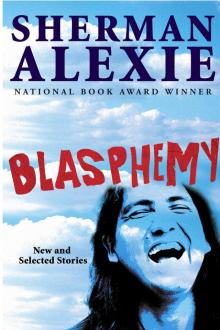 Blasphemy: New and Selected Stories
Blasphemy: New and Selected Stories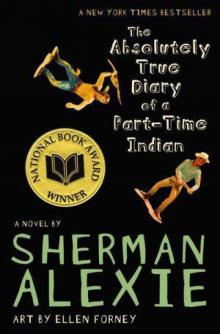 The Absolutely True Diary of a Part-Time Indian
The Absolutely True Diary of a Part-Time Indian Flight
Flight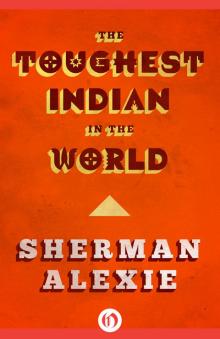 The Toughest Indian in the World: Stories
The Toughest Indian in the World: Stories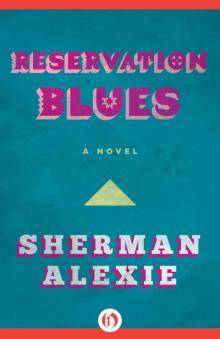 Reservation Blues
Reservation Blues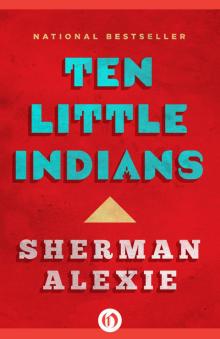 Ten Little Indians: Stories
Ten Little Indians: Stories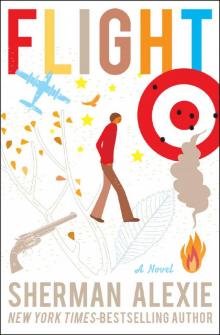 Flight: A Novel
Flight: A Novel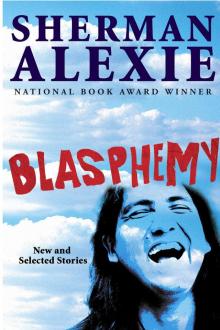 Blasphemy
Blasphemy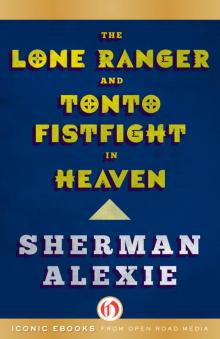 The Lone Ranger and Tonto Fistfight in Heaven
The Lone Ranger and Tonto Fistfight in Heaven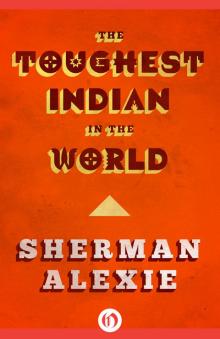 The Toughest Indian in the World
The Toughest Indian in the World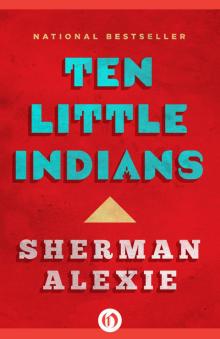 Ten Little Indians
Ten Little Indians